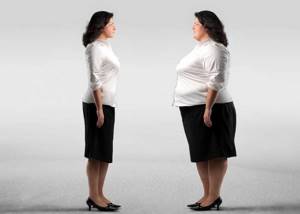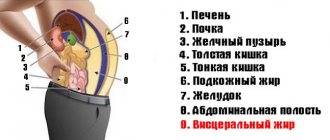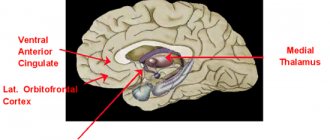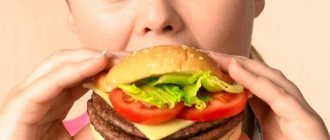Binge eating disorder is an eating disorder, obsessive bouts of excessive food consumption, caused not by physiological needs, but by psychological reasons.
In the modern world, people are often tense, many experience constant stress. Fleeing from the consequences of emotional breakdowns, a person seeks a way out of a critical situation. Some find salvation in hobbies, others in food, which not only provides energy for the normal functioning of the body, but can also bring pleasure. Trying to calm himself down by eating something tasty, a person uses food as an antidepressant.
Occasional “belly celebrations,” which bring relaxation after nervous fatigue, develop into a habit and occur unconsciously after each emotional trauma. At the same time, easily digestible, high-calorie foods rich in carbohydrates and fats are consumed, addiction to which leads to addiction. And many food manufacturers, in turn, do everything to enhance the taste of products and thereby increase their consumption.
Over time, people's sense of fullness gradually diminishes, and the portion and number of meals increases. The consequence of overeating is remorse, self-flagellation, guilt and the next “eating” of numerous problems. A food addiction develops, from which it is impossible to overcome it on your own.
Signs of compulsive overeating
Binge eating disorder differs from bulimia in that the person becomes upset and feels guilty after overeating. With bulimia, people vomit after eating or take laxatives.
Binge eating disorder causes a feeling of disgust after eating. A person begins to reproach himself for the fact that he overate and could not restrain himself. Depression sets in and a bad mood arises. I would like to eliminate my lack of self-control, but this is impossible to do.
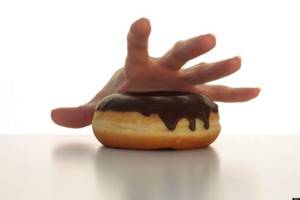
Compulsive overeating occurs when stress appears and you want to eat a bad mood. But such consolation only lasts for a short period of time. Reality returns again along with self-hatred and regret about what is happening.
The more often the signs of compulsive overeating occur, the more you want to eat. This all turns into a vicious circle that is difficult to break on your own.
How dangerous is such overeating?
Compulsive overeating is a very dangerous syndrome, as it leads to obesity, diabetes and other metabolic problems, and causes cardiovascular pathologies. This is not a complete list of ailments that overeating causes. With this disease, the diet shifts towards fatty, sweet foods, which are low in vitamins and minerals. Therefore, their deficiency occurs, which only worsens the state of health.
Due to high-calorie foods, the patient cannot lose weight. Excess weight from CP only aggravates all the mental suffering of a person. Dissatisfaction with oneself increases, which leads to isolation and the inability to fully communicate with friends and improve personal life. This condition interferes with work, further lowers self-esteem and drives you into deep depression. Sometimes this leads to isolation and thoughts of suicide.
People with this problem try to keep their condition a secret, so often even their loved ones have no idea about the eating disorder. This leads to the patient seeking medical help in a very advanced state.

Drug treatment for compulsive overeating disorder

- After conducting a certain examination, the doctor prescribes medication for compulsive overeating. Drug treatment can also be prescribed at the patient’s request.
- First of all, antidepressants are prescribed. Taking appetite suppressants is considered ineffective. They can only be recommended by dubious sources
- The doctor will prescribe medications to treat concomitant diseases - diabetes, high blood pressure. A specialized specialist recommends medications taking into account the person’s general condition and the presence of pathologies
- If there is obesity, then the doctor prescribes treatment to eliminate this disease. Conversations are held on proper nutrition, the patient’s lifestyle is reviewed, and individual sports activities are selected

As auxiliary methods, liposuction or surgery to reduce the volume of the stomach can be performed. However, without getting rid of psychological problems, the effect will occur only for a short period of time.
Psychotherapy for compulsive overeating

Diseases associated with eating behavior are successfully treated with psychotherapy. Fighting the habit of overeating, replacing bad habits with healthy ones, controlling emotions and mood, acquiring certain skills for managing stressful situations.
Psychotherapy for compulsive overeating can push a person towards all these aspects. Three types of psychotherapeutic treatment are used: behavioral, cognitive psychotherapy, deep hypnosis with suggestion.
Causes
The causes of the violation lie in 4 groups of factors:
- physiological;
- genetic;
- emotional;
- social.
Physiological
The first group is closely associated with pathological changes in hormonal balance and metabolism. In this case, the brain sends a signal of hunger, resulting in an attack of gluttony. Also, with somatic pathology, a person is able to confuse the feeling of thirst and hunger. The logical result is the absorption of sandwiches, although you can cope with the feeling simply with a glass of water.
Genetic
Genetic predisposition is expressed in the mutation of several genes that cause compulsive overeating. The effect of mutagenic changes is:
- stimulation of increased appetite;
- inhibition of the saturation process;
- tendency to be overweight and overeat even in the absence of problems.
Psychological
Psychological preconditions are the most common group of causes of eating disorders. Overeating becomes a pathological reaction to:
- breakups;
- conflict situations;
- difficulties at work;
- pronounced fear and anxiety;
- a feeling of powerlessness in a given situation;
- constant feeling of guilt;
- consequences of extremely low self-esteem.
Social
Social factors are associated with the cult of slimness in modern society. Non-compliance with the standard provokes 2 types of psychological response:
- protest, which consists in the desire to bring oneself to grotesque completeness;
- a feeling of total powerlessness when it is impossible to correct weight, which is expressed in “eating” negative emotions.
A separate group includes reasons related to the characteristics of upbringing. They may suddenly appear after adulthood or provoke a disorder in adolescents:
- a chain fixed by parents: you ate a full lunch - an obedient child, refused to finish a portion - you will be punished;
- dysfunctional family situation;
- lack of emotional closeness with family members.
How to treat compulsive overeating on your own?

The main emphasis must be placed on your psyche. It is necessary to get rid of daily stress and depression.
Advice: Learn to control your appetite.
It’s difficult to do this on your own and that’s why many people make mistakes. If you don’t have time to go to the doctor or don’t want to do it, then the question arises, how to treat compulsive overeating yourself? You will definitely succeed if you don’t make the following mistakes:
- following a strict diet. This is contraindicated, since the restriction will lead to a breakdown and the symptoms will return again.

Advice: Avoid diets, but watch your diet. Eat more vegetable salads and eat every 2 hours, but in small portions.
- purchasing large quantities of food and storing it at home
Tip: Protect your body with distance from food. It’s better to go to the supermarket one more time than to fill the refrigerator with food. Put a limited amount of money in your wallet so as not to accumulate extra food. If there is such an opportunity, then let one of your relatives go to the store for food.
- achieving a quick effect

Advice: If you want to get rid of compulsive overeating, then tune in to long-term treatment. During this time, your thinking and attitude towards food should change. Realize that a person needs food to maintain health, and not to eat away stress.
Why we don’t lose weight: superficial, deep reasons and their solution
Self-regulation training “Key”
To work through these reasons, you don’t have to go to a psychologist or join a group. All you need is a pen, paper and some free time.
Eating sorrows
The habit of throwing candy or sausage out of any stress is formed in childhood. They console an upset child with sweets, reward him for successes, and punish him with absence for misdeeds. Anxious grandmothers stuff kilograms of food into their children so that they don’t suddenly get sick.
In a fragile brain, a stable neural connection is formed: “Food is love.” And then with love we eat away quarrels with loved ones, failures at work, stress from bad weather and even joy. The body cannot handle any strong emotions without its drug.
Solution
Think carefully about the fact that you constantly overeat, are you satisfied with everything in life? Are you deceiving yourself with the thought, “Everything is fine with me.” Happy people don't overeat.
There is a good exercise for analyzing your areas of life “12 Resources”. Draw a circle or table, divide it into 12 parts. Write the name of the sphere in each cell.
- Image. It's how you look and how other people perceive you.
- Economy. Money, shopping, standard of living.
- Studies. Self-education and pleasure from new knowledge.
- Family. Relationships with parents, children, husband or partner (if you live together).
- Creation. The pleasure of creating paintings, poems and other things or the pleasure of other people's masterpieces.
- Health. Condition of the physical body: nutrition, training, self-care.
- Love. This is a romantic, platonic relationship.
- Sex. Sexual sphere: quantity and quality.
- Altruism. Volunteering, charity, good deeds.
- Job. Satisfaction with work, workplace, conditions and other things.
- Friendship. Communication with like-minded people.
- Trance. Meditation and other mind-altering practices.
In each area, write the state of the resource:
- Disabled - this means this area is not in your life at all. For example, you are currently on maternity leave and not working.
- Frustrated - there is a resource, but there are problems in it: you have a partner, but there is no joy in the relationship.
- Pumped up - everything is good in this area.
- Addiction is the worst of conditions. For example, a woman dissolved in children (family) or focused on making money (economy). Don't judge the results - it's just a snapshot.
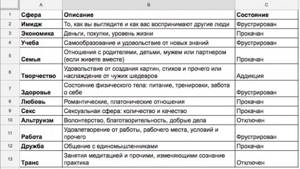
What can you change? We take only those areas whose condition you are not satisfied with. If you don’t have time for friendship right now and want to pay attention to other things, let’s leave it that way. For example, you don’t like the way you look (image): write a plan of what you can do. Go to the gym, pay a stylist, or take a speaking class. We describe what you will do and when. And so on for each area.
No motivation
Our subconscious is like a five-year-old child. Explain to a little girl or boy how great it is to have a million dollars or weigh 50 kilograms. They will twirl their finger at their temple. Now tell me how cool it is to use this million to buy a lot of red cars without tops or to become a beauty and be like a Barbie doll. What will be clearer to the child?
Our brain simply doesn’t understand why it needs to work so hard and saves energy by sabotaging all endeavors. But if your dream job only hires slim people or you don’t have enough money to pay for two seats on a plane, that’s motivation.
Solution
Take a piece of paper and a pen and write why you need to lose weight. For example, to be beautiful. And then you ask yourself the question “Why be beautiful?” Suppose to please men. Why should they like it? To get married? What for? Step by step, we shake off the husks, getting to our true desires.

Try to get to the root cause by consistently answering and asking questions, getting to the point
Or set a timer for 20-30 minutes and write in this notebook everything that comes to mind on the topic: “What good will happen if I lose weight.”
Fears and hidden benefits
If weight appeared as a protection, then it is almost impossible to get rid of it with the help of diets. Sometimes it plays the role of personal boundaries: the wife eats in order to at least somehow isolate herself from her husband, who completely controls her.
As strange as it may sound, weight can protect you from romance, social activity, and from life itself. A person justifies his failures with extra pounds, and if they suddenly disappear, he will have to decide something, and this causes fear and discomfort.
Solution
Imagine an image of yourself slim. Is it cozy? How do you live at your new weight, what do you do, where do you work, who do you communicate with? What do you eat? How do others treat you? Think through everything down to the smallest detail. Do you like this life? Write down everything you present.
Add new details throughout the month. If you don't like something, remove it and replace it with other parts. Come up with the world in which you want to live.
Even if there is no fear, and the image evokes intense joy, remember - the brain is afraid of strong emotions, both good and bad. Therefore, imagine your new life in bright colors, but calmly. That life in which being slim is normal, and even somehow everyday. Well, they offered you a hand and a heart, tomorrow they will offer you five more times. We bought ourselves fashionable jeans in size S, as you always buy like that.
To help your brain quickly form a positive image, focus on being slim: look at slender girls on the street, at elegant things, make a collage of photographs of figures in swimsuits that you consider ideal. Try on new clothes using Photoshop.
Locks and settings
There are many voices in our heads that often attract things that are not what we want. “There should be a lot of good people”, “It’s easy to give birth with wide hips”, “Fat people are kind, and thin people are evil.” And so you tell yourself that you want to lose weight, but your subconscious whispers that “Men are not dogs.” It’s like saying that you want to be an engineer, but in your heart you dream of an acting career.
Solution
We take the same piece of paper and write what you think about weight, the concepts of slim and fat, losing weight. What did your relatives, friends, teachers tell you about this? Even if you heard something once and didn’t attach any importance to it, write anyway. You don't have to do this exercise in one sitting. It’s better to carry a notebook with you for a week: if you remember something, write it down.
Then we take each belief and write its opposite opposite. We are looking for examples from life, any evidence that this is not true. For example, the sacramental “Men are not dogs, they don’t throw themselves at bones.” And we are looking for proof that they don’t throw themselves at bones, but at slender forms they do.

Write down all the beliefs and their explanations that you remember for at least a few days
When I wrote my beliefs, I was surprised to remember that as a child I was often told that I looked like my father, and I was very proud of this. My dad is far from a thin man. I had to convince my brain that I could be like him and show love in a different way.
I also worked with beliefs using the Descartes square. We take each belief and write as many points as possible for each.
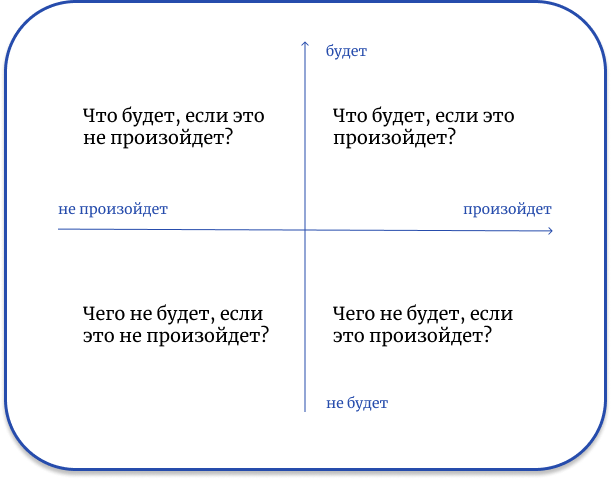
Fill the square in a circle at least three times in each square. Every time you “forget” what you wrote in the previous square, you can even cover it with paper.

In a square I work through beliefs and in the process comes the realization that you really think about it and where it comes from in the subconscious
Diet for compulsive overeating. Can you diet with an eating disorder?

As mentioned above, any diet with compulsive overeating causes great harm to the body.
Important: Eat right. Three times - breakfast, lunch and dinner - main meals, the rest is a snack (fruit, unsweetened yogurt).
Our body is designed in such a way that the pancreas, liver, stomach and other digestive organs work when we eat. If you go on a diet and starve, then the body will be stressed and it will begin to accumulate fat until better times. Therefore, it is unacceptable to go on a diet, especially with an eating disorder.
What is bulimia nervosa?

Bulimia, or more accurately known as bulimia nervosa, is an eating disorder characterized by cyclical recurrence of compulsive overeating. A person with this diagnosis has an excessive appetite.
The patient can induce vomiting, empty the gastrointestinal tract using laxatives or enemas, use diuretics to stimulate bowel movements, urination and other processes.
People suffering from this disease can wear down their bodies with these processes, adding strenuous exercise to compensate for the constant overeating. Bulimics can subject their bodies to long fasts, which they believe are compensation for gluttony.
Types of disease
Eating disorders are classified according to different criteria:
- Feels like it. It can be obvious and hidden. In the first case, there is a feeling of overeating, drowsiness, heaviness in the stomach due to large volumes of food, i.e. the person clearly knows that he has overdone it. In the second case, there are no obvious sensations. They occur when snacking on the run, finishing a meal with desserts, when the daily caloric intake exceeds the norm.
- Due to the occurrence. Gluttony is provoked by external factors: attractive packaging, advertising, shop windows, aroma, then the attacks are impulsive. There are also internal (emotional) reasons.
- The presence or absence of guilt. More often, with obvious overeating, they are noted and follow attacks. With hidden RPP, remorse may be absent. But these rules do not always work. Some people may brag about eating too much.
In addition to compulsive overeating, eating disorders include anorexia nervosa, bulimia, psychogenic vomiting, and eating inedible substances in children or adults. These diseases are obsessive in nature - they cause obsessive, frightening thoughts, the person is obsessed with the idea of food.
Consequences of bulimia nervosa
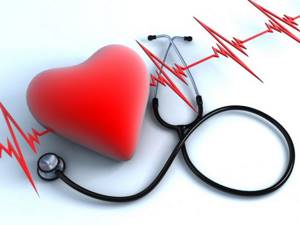
All manifestations of this disease have their consequences, serious physical problems for the body. These include the following manifestations:
- damage to tooth enamel caused by constant exposure to stomach acids
- damage to the gastric mucosa
- cardiac and vascular pathologies
- bleeding from stomach to throat
- problems with vocal cords
- eye and skin diseases
- hair loss

Often people begin to struggle with the consequences of bulimia nervosa, but it is important to get rid of the underlying disease and the causes that cause it. A bulimic may not consult a doctor on his own, because such a disease is an addiction that stands alongside alcohol or drug addiction. A person may not understand that he is sick, so he needs help.
Important: Prejudices and instructions from relatives will not help. It is necessary to contact a specialist who will correctly diagnose and prescribe treatment that is correctly selected for a particular patient.
Check out our fasting programs
At your service are programs of therapeutic fasting from three to fourteen days; all programs include accommodation, procedures, examinations and consultations
GolodSPA 3
Nutritional reboot
changing eating habits
GolodSPA 3
Program 3
day fasting program
GolodSPA 7
Weight loss and rejuvenation
rejuvenation and strengthening of immunity
GolodSPA 7
Program 7
day fasting program
GolodSPA 10
Intensive weight loss
rejuvenation and disease prevention
GolodSPA 10
Program 10
day fasting program
GolodSPA 14
Natural healing
treatment without pills
GolodSPA 14
Program 14
day fasting program
GolodOnline-8
Learning how to fast safely
treatment without pills, home fasting
GolodOnline-8
Program 8
2 days of preparation, 3 days of fasting, 3 days of recovery
HepaSpa 3
Liver cleansing
treatment without pills
HepaSpa 3
Program 3-
day course of liver cleansing; Sunday-Tuesday
Can bulimia lead to anorexia?

For patients with bulimia and anorexia, controlling their weight becomes an important life goal. This is a threatening way to solve your problems. Bulimia can lead to anorexia if the condition is not treated professionally.
A bulimic often goes on debilitating diets and this will ultimately lead to severe anorexia, even fatal. Just as bulimia can lead to anorexia, anorexia can lead to bulimia if the necessary steps for recovery are not taken.
Important: Do not self-medicate! Contact a specialist, because only a professional can find the true cause of the disease and rid the person of it forever.
Why you need to look for the reason in your head
Since the time of dinosaurs and the first humans, food has symbolized safety. If you don't get food, you'll die. Now, of course, you need to try hard to die of hunger, but the brain doesn’t care - it has instincts and genetic memory. Why you don't feel safe even though there's a supermarket across the road needs to be sorted out.
Dialectical behavioral therapy for correction of eating behavior
Of course, not all people who lost weight delved into their heads. They made efforts and were inspired by girls from weight loss publics. But the weight didn’t just appear, it protected me for some reason. And if you don’t solve the problem in your head and lose weight this way, then the best outcome is that the weight will simply come back. And in the worst case, it will be replaced by illness or depression, which will take on its previous function.
During a group lesson, the psychologist invited us to imagine and draw an image of our excess weight, and then of our ideal weight. I closed my eyes and saw a warm, cozy plump woman in a sundress and kokoshnik, whom everyone loves, compliments, and invites to visit. The smile creeped up on its own.

My “fat” alter ego evokes pleasant and warm associations that I don’t want to part with
The image of thinness caused tension in the body and vague anxiety: the imaginary slender woman was arrogant and angry. Now it became obvious to me why the kilograms do not go away - would anyone, of their own free will, give up something warm and good in favor of anxiety and the unknown?
How to eat with bulimia? Intuitive eating and bulimia

Learning to eat healthy is much more difficult than starving or overeating. Don't get hung up on food and wonder how to eat if you have bulimia. Nutrition should be close to physiologically adequate, that is, how much energy a person spends, so much he should replenish with food.
Advice: First try to slightly reduce the caloric content of your food - 100-200 kcal. Weight correction will occur, but you will not feel hungry, and you will not break into a new dose of gluttony.
It will be important for a person to introduce intuitive eating for bulimia. Back when we were babies, no one taught us how to eat. The child eats when the physiological need arises. He eats as much as he needs.
Later, mothers, fathers, grandfathers and grandmothers instill their food culture in the baby, but this is wrong. This second stage of a person’s acquaintance with food involves the presence of hearty lunches, grandma’s pies and a lot of sweets. But the most correct was the first stage - intuitive, after birth. This is the truest and truest healthy nutrition!

Then a person grows up and realizes that he can afford to buy everything - any food. Gatherings with friends and festive feasts begin. All this leads to digestive problems and eating disorders. Therefore, it is important to eat at the level of intuition. You need to eat if you have a real feeling of hunger.
Important: Eat food in such quantities as to satisfy your hunger a little, and not to fill your stomach to capacity or to the point of pain.
Symptoms
Many people who suffer from excess weight and unhealthy eating habits are tormented by the question of how to overcome gluttony.
But first you need to find out whether this is a short-term “glutton,” which many people experience due to stress (this often happens in women during PMS) or a truly serious disorder that requires the help of a specialist. Compulsive overeating has the following symptoms:
- Cravings for food and thoughts about it are constantly present.
- Very large portions are always placed on the plate.
- Absorption of food continues even after the onset of a feeling of fullness and fullness of the stomach.
- Any free time, leisure time, is accompanied by snacks.
- I don’t have the energy to pass by the display cases with “goodies”; I have to buy another cake, a portion of ice cream, etc.
- Absorption of food occurs quickly; a person often puts food into his mouth in large pieces, chewing poorly.
- Even with the realization that you need to stop and not eat anymore, there is no will to do it.
- I want to “eat up” any upset, shock, bad mood, or fatigue, as if encouraging myself with this.
Gluttony, as a disease, can also be accompanied by a feeling of guilt that a person experiences for his excessive consumption of food, and the desire to eat alone so that no one sees huge portions and does not judge.
If such symptoms continue for more than a month, this is no longer a short-term breakdown, but a real somatic problem that requires a serious approach.
On a note! Uncontrolled eating in stressful situations, for example, before an exam or an important interview, and normalization of eating behavior after the events have passed, is not a compulsive disorder.
How to treat compulsive overeating: tips

Almost every person enjoys over-indulging in large quantities of food. This harmless habit leads to problems that are then impossible to get rid of. Many people wonder how to treat compulsive overeating?
Someone finds salvation in a psychotherapist or hypnologist who gives the right instructions. Others try to change something in their heads on their own, getting rid of stress and depression, returning to normal life. Everyone finds their own way!
Advice from people who have gone through this and their reviews about this or that type of treatment will help you avoid negative consequences for the body and help yourself.
Advice: Stop dieting and don't think about food. Don't blame yourself after overeating.
Important: In the first six months of treatment, breakdowns are considered normal, then they will disappear completely.
Advice: Get rid of the desire to lose weight, you will want to get better! Take antidepressants prescribed by your doctor to help calm you down. Get enough sleep and less stress.
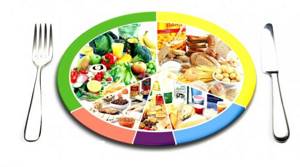
Advice: Eat healthy, in small portions - no more than a handful. Eliminate sweets, spices, smoked foods and salt. Don't force yourself to drink green tea - drink purified water. Add walking or light jogging in the morning. In a month, start running at the stadium.
There is a well-known statement: “A person must eat to live, and not live to eat.” Remember this and everything will be fine!
How does bulimia differ among groups of people of different ages?
Based on the total number of people suffering from bulimia, we can determine the following statistics:
- 20% are children and teenagers
- 30% are men
- 50% are women
Childhood bulimia is provoked by an immature psyche and the inability to cope with psychological stress. Also, most often, bulimic children appear in those families where the parents themselves suffer from this problem. Unbalanced children's nutrition and a violation of the general diet lead to the manifestation of the disease, and constantly forcing a child to eat in cases where he is not hungry only aggravates the situation.
Another reason for increased appetite in children is constant stress: dissatisfaction with oneself, divorce of parents or their bad relationships, misunderstandings with peers, violence and conflicts in society. Causes of childhood bulimia:
- incorrect metabolism
- unbalanced psyche
- habit of eating in excess
- imposition by society and food advertising
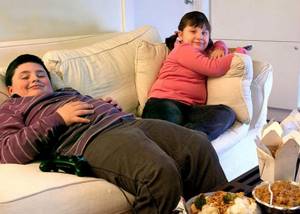
Female and male bulimia are almost similar. It is quite easy to identify their signs:
- obesity and overweight
- depressed mood, apathy towards the outside world and a depressive state
- close dependence on food
- regular stress and increased anxiety
- constant use of medications
It’s not for nothing that the “strong” sex has such a name and is often more resistant to various factors, so its percentage of sufferers is lower. Men also do not have a particular desire to follow diets or induce gag reflexes. Women most often take laxatives, while men engage in sports and physical activity.
